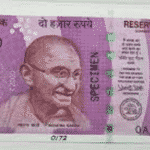Rs. 500 and Rs. 1000 notes ban: Impacts
- In a major blow to black money, fake currency and corruption, the union government has decided to demonetize Rs. 1000 and Rs. 500 notes with effect from 8th November 2016. This means that these notes will no longer be a legal tender and hence of no value.
- These notes account for 80 percent of all currency in circulation.
- All notes with a lower denomination and coins will still be valid.
- But these notes can be deposited in bank accounts and post office accounts from November 10 till December 30.
- People who possess these notes even after December 30, 2016 can get them exchanged at RBI till March 31, 2017 by providing a declaration.
- A new series of Rs. 500 and Rs. 2000 currency notes will be brought into circulation which will be Braille compliant.
Positives
- Fake currency notes are used extensively by terrorists to finance terrorism. The step will help in combating terrorism.
- It will give a boost to formal modes of payment and honest taxpayers.
- Deflationary impact will be seen on real estate prices.
- The election system will be hit hardly as they are largely funded by black money. This money is often used to bribe voters.
- Corruption will be reduced as it will not be possible to bribe a person with higher denomination notes.
- As per the government, the step will benefit the poor and the middle-class by bringing real estate and education within their reach.
Negatives
- The move is hardly a major step against curbing black money as one set of notes is being replaced by another set of higher denomination notes.
- The move will create hassles for traders, small-time businessmen and housewives.
- The commom man will suffer the most as it is a festive and marriage season, paddy has been sent to market after being harvested and sowing of rabi crops is under progress.
- Many doubt the capabilities of Indian banks to implement such a major decision within a short span of time.
- There is also a risk of a political backlash at the Prime Minister and his party.
Previous steps by Modi government
- A Special Investigation Team (SIT) was set up by the Modi government on black money.
- A law on disclosure of foreign bank accounts was passed in 2015.
- To curb benami transactions, stringent rules were put in place in 2016.
- A scheme to declare black money was also introduced in 2016.
- The GST to be implemented next fiscal will also help the government fight against black money.
The move signals an intent of the government to move the country towards a cashless economy striking at the very foundation of black money transactions.
500₹ & 1000₹ के नोटों पर प्रतिबंध : प्रभाव (Rs. 500 and Rs. 1000 notes ban: Impacts)
- काला धन, नकली मुद्रा और भ्रष्टाचार को एक बड़ा झटका देते हुये केंद्र सरकार ने 1000₹ और 500₹ के नोटों का विमुद्रीकरण का फैसला किया है,जो की 8 नवम्बर 2016 से प्रभाव में आ जायेंगे । इसका मतलब यह है कि ये नोट अब एक कानूनी निविदा नही है और इसका कोई मूल्य नहीं हो सकता है।
- इन नोटों का संचलन सभी मुद्रा का 80 प्रतिशत है।
- कम मूल्य के सिक्के और नोट अभी भी मान्य होंगे।
- 10 नवंबर से 30 दिसंबर तक इन नोटों को बैंक खातों और डाकघरों में जमा किया जा सकता है।
- जो लोग 30 दिसंबर2016 के बाद भी इन नोटों को बदलते है, उन्हें 31 मार्च, 2017 तक भारतीय रिजर्व बैंक के यहाँ इसे घोषित कर बदल सकते हैं।
- 500₹ & 2000₹ के नोटों की एक नई श्रृंखला परिसंचरण में लाया जाएगा जिसमें अंकित शब्द दृष्टिविहीनो द्वारा पढ़ने में सम्भव होगा।
सकारात्मक पहलू
- नकली नोट आतंकवाद के वित्तपोषण के लिए आतंकवादियों द्वारा बड़े पैमाने पर इस्तेमाल किये जा रहे हैं, इस कदम से आतंकवाद से मुकाबला करने में मदद मिलेगी।
- यह औपचारिक भुगतान तथा ईमानदार करदाताओं को बढ़ावा देगा।
- मंदी का प्रभाव रियल स्टेट की कीमतों में देखा जाएगा।
- उन चुनाव प्रणालीयो को सबसे ज्यादा झटका लगेगा जो काफी हद तक काले धन के द्वारा वित्त पोषित हो रहे हैं। यह पैसे अक्सर मतदाताओं को रिश्वत देने के लिए प्रयोग किया जाता है।
- भ्रष्टाचार कम हो जाएगा, क्योंकि उच्च मूल्य वर्ग के नोटों के साथ किसी व्यक्ति को रिश्वत देना असम्भव होगा
- सरकार के अनुसार यह कदम गरीब और मध्यम वर्ग के लोगो को जमीन और शिक्षा का लाभ उनकी पहुंच के भीतर दिलाएगा।
नकारात्मक पहलू
- यह शायद ही काले धन को रोकने के लिए बड़ा कदम हो क्योकि नोटों के एक सेट को उच्च मूल्य वर्ग के दूसरे नोट से प्रतिस्थापित किया जा रहा है ।
- इस कदम से व्यापारियों, छोटे समय के व्यापारियो और गृहिणियों के लिए बाधा पैदा होगी।
- इस समय उत्सव और शादी-विवाह सीजन चल रहा है, धान काट कर बाजार में बिक्री के लिए भेज दिया गया है, रबी फसलों की बुवाई का कार्य प्रगति पर है इसलिए आम आदमी को सबसे ज्यादा भुगतना होगा।
- कई भारतीय बैंकों की एक छोटी सी अवधि में इस तरह के एक बड़े निर्णय को लागू करने की क्षमताओं को लेकर शक है।
- प्रधानमंत्री और उनकी पार्टी पर एक राजनीतिक प्रतिक्रिया का भी खतरा है।
मोदी सरकार द्वारा उठाये गए पिछले कदम
- काले धन पर एक विशेष जांच दल (एसआईटी) मोदी सरकार द्वारा स्थापित किया गया था।
- विदेशी बैंक खातों के खुलासे पर एक कानून 2015 में पारित किया गया था।
- बेनामी लेनदेन पर अंकुश लगाने के लिए कड़े नियम 2016 में लागू किये थे।
- काले धन की घोषणा करने के लिए एक योजना भी 2016 में पेश किया गया था।
- जीएसटी अगले वित्त वर्ष में लागू किया जाना भी काले धन के खिलाफ सरकार की लड़ाई में मददगार होगी ।
सरकार का यह संकेत देश को काले धन के लेन-देन की नींव पर प्रहार करते हुए कैशलेस अर्थव्यवस्था की तरफ स्थानांतरित करने के आशय से है।











